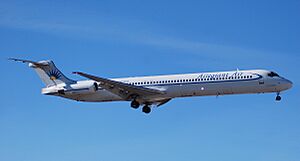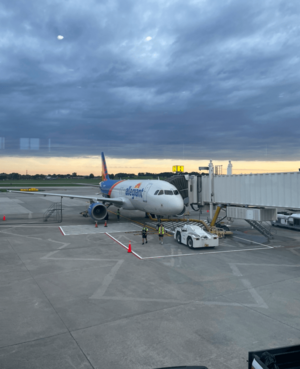Allegiant Air facts for kids

An Allegiant Air Airbus A320
|
|
| Founded | January 1997 |
|---|---|
| Commenced operations | June 1998 |
| AOC # | WX0A156I |
| Operating bases |
|
| Frequent-flyer program | Allways Rewards |
| Fleet size | 129 |
| Destinations | 124 |
| Parent company | Allegiant Travel Company |
| Headquarters | 1201 North Town Center Drive Las Vegas, Nevada, United States |
| Key people | Gregory C. Anderson (CEO) |
Allegiant Air is an American ultra-low cost airline based in Las Vegas, Nevada. It's known for offering very affordable flights, especially for people traveling for fun. Allegiant flies to smaller and medium-sized cities that other big airlines might not serve. They keep ticket prices low, but you pay extra for things like choosing your seat or bringing a large bag.
Allegiant started in 1997 and is part of a bigger company called Allegiant Travel Company. It is one of the largest airlines in North America.
Contents
How Allegiant Air Started
Early Days and Name Change
Allegiant Air began in January 1997. It was first called WestJet Express. However, the airline had to change its name. This was because another company already used a similar name. Also, it sounded too much like WestJet Airlines from Canada. So, the airline became Allegiant Air.
It received permission to fly scheduled and charter flights in the U.S. on June 19, 1998. They also got permission to fly charter services to Canada and Mexico.
First Flights
Allegiant Air started its first regular flights on October 15, 1998. These flights were between Las Vegas and Fresno, California. They used McDonnell Douglas DC-9 airplanes. By late 1999, they were flying nonstop between Fresno and Las Vegas. They also flew to Burbank and Lake Tahoe.
Growing the Airline
Changes in the 2000s
In 2000, Allegiant Air opened a small hub in Long Beach, California. They flew nonstop to Fresno and Las Vegas from there. Later, they added flights to Portland and Reno.
In 2000, Allegiant faced high fuel costs. This led them to file for bankruptcy protection. This allowed Maurice J. Gallagher Jr., who was owed money by the airline, to take control. In June 2001, Gallagher changed Allegiant's business plan. He made it a low-cost airline. The new plan focused on flying to smaller cities that bigger airlines didn't serve. Allegiant's main office also moved to Las Vegas.
Allegiant came out of bankruptcy in 2001. In 2002, they started a long-term deal with Harrah's casinos. They provided charter flights to casinos in Laughlin and Reno. Around this time, they also got their first McDonnell Douglas MD-80 airplane. By 2004, Allegiant was flying from 13 small cities to Las Vegas. They also offered flight and hotel packages.
In 2006, Allegiant had 21 MD-80 planes. They flew nonstop to 40 small cities. Most of these flights went to Las Vegas or Orlando/Sanford, Florida. In October 2007, Allegiant opened a new base at Phoenix-Mesa, Arizona. This connected 13 cities to the Phoenix area. This airport joined Las Vegas, Orlando, and Tampa/St. Petersburg as important bases for the airline.
In November 2007, Allegiant opened another base at Fort Lauderdale. In January 2008, they opened a base in Bellingham, Washington. Many people from Vancouver, Canada, use the Bellingham airport to fly with Allegiant.
Growth in the 2010s
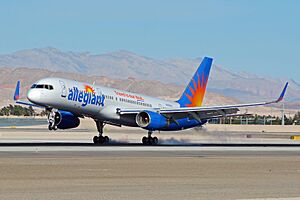
In January 2010, Allegiant celebrated flying its one-millionth passenger from Phoenix-Mesa Gateway Airport. The company also bought 18 more used MD-80 planes. In February 2010, Allegiant opened a base at Gerald R. Ford International Airport in Grand Rapids, Michigan. They later reduced their operations there but still fly from Grand Rapids.
Allegiant bought six used Boeing 757-200 planes in March 2010. They planned to start flights to Hawaii. They got approval to use these planes in July 2011. However, Allegiant no longer flies to Hawaii.
In July 2015, Allegiant Air announced new bases at Asheville Regional Airport and Cincinnati/Northern Kentucky International Airport. In August 2017, they added a base at Indianapolis International Airport. By 2017, the airline flew 12 million passengers on its 99 planes to 120 places. In February 2018, Allegiant added a base at Destin–Fort Walton Beach Airport. In June 2018, they added another base at McGhee Tyson Airport in Knoxville, Tennessee. In January 2019, Allegiant announced a base at Gerald R. Ford International Airport in Grand Rapids, Michigan. They also added a base at Des Moines International Airport in Des Moines, Iowa in 2021.
Recent Years (2020s)
On February 12, 2021, Allegiant started flights to John Wayne Airport. They flew to 8 cities from there, including Boise and Las Vegas.
On August 10, 2021, Allegiant announced two more operating bases. These were at Appleton International Airport and Bishop International Airport. They opened in March 2022.
On October 7, 2021, Allegiant began nonstop flights from Minneapolis-St. Paul International Airport. They flew to Asheville, North Carolina, and Palm Beach, Florida. They later added more cities like Punta Gorda, Florida, and Phoenix-Mesa, Arizona. They use Airbus A320 family planes for these routes. In 2021, Allegiant also started working with Viva Aerobus to add more flights between the U.S. and Mexico.
How Allegiant Air Works
Business Model
Allegiant mainly serves people traveling for fun. This includes travelers from colder places going to warm tourist spots. Examples are Punta Gorda, Tampa, Las Vegas, Orlando, Los Angeles, and Phoenix. The airline often flies to smaller places that don't have many direct flights from major airlines. They try to avoid routes where other airlines compete.
Allegiant also tries to keep airport costs low. For example, they sometimes rent ticket counters only when they need them. They also hire other companies to provide staff. The airline prefers to use smaller, secondary airports. These airports often charge lower fees. Examples include Orlando Sanford and Phoenix-Mesa. Allegiant is often the only airline with year-round service at these smaller airports.
Many of Allegiant's customers are Canadians. They save money by crossing the border to the U.S. and flying from U.S. airports. This is because Allegiant advertises in Canada and flies from airports near the Canada–U.S. border.
Allegiant keeps its costs low by buying used planes or getting big discounts. Used planes might use more fuel, but Allegiant flies them less often. This helps keep fuel costs from being a big problem. Allegiant also plans its crew schedules so that pilots and flight attendants usually return home at the end of the day. This saves money on hotel rooms.
Allegiant sells flights only through its website. This helps them control prices. They also sell extra things for a fee. They do not offer connecting flights. You can only buy nonstop trips on their website.
Extra Fees and Services
Allegiant makes money not just from tickets, but also from extra fees. These are called "ancillary revenues."
- Fees for checking luggage.
- Fees for bringing a large carry-on bag.
- Buying food and drinks on the plane.
- Choosing your seat in advance.
Allegiant also earns money by offering hotel rooms, car rentals, and tickets to tourist attractions on its website. They sell vacation packages called Allegiant Vacations. They work with many hotels in Las Vegas and the Orlando area. Commissions from these packages can be a big part of the airline's income.
Charter Flights
Allegiant also flies charter flights. These are special flights for groups or companies. For example, they have flown firefighters for the United States Forest Service. They also fly college basketball teams.
Allegiant used to fly charter services for casinos. They would fly customers to casino properties in places like Laughlin and Reno. These contracts ended in December 2012.
Sponsorships
Allegiant Air sponsors many sports teams and events:
- In July 2018, Allegiant became the official airline of Minor League Baseball (MiLB).
- In September 2018, they partnered with the National Hockey League's Vegas Golden Knights.
- On June 3, 2019, soccer club FC Cincinnati announced a deal with Allegiant. Allegiant became the club's official airline partner. The team's stadium, TQL Stadium, even has an entry gate named after the airline.
- On August 5, 2019, Allegiant made a 20-year deal with the Las Vegas Raiders (NFL team). This deal gave Allegiant the naming rights to the team's new home, Allegiant Stadium, in Paradise, Nevada.
- In January 2020, Allegiant became the official airline of the Indianapolis Colts (NFL team).
Allegiant Air's Look
Allegiant Air's planes have a bright sunburst design on the tail. This design shows that the airline focuses on "sun" destinations. The design was created by Tiami Designs in Atlanta, Georgia.
Safety and Fleet Changes
Safety Discussions
In 2015, Allegiant Air was watched closely by the FAA (Federal Aviation Administration). This was after several emergency landings and flights that had to turn back. A former mechanic said that some maintenance steps were not always followed. A survey found that many of the airline's older MD-80 planes had made emergency landings. These planes were about 29 years old on average.
In May 2016, the FAA did a special inspection of Allegiant. Allegiant stated that the FAA found their safety issues to be "minor."
In November 2016, a newspaper reported that Allegiant's planes were more likely to have problems during flights than other major U.S. airlines. A TV news report in 2018 also looked into these issues. Public records showed that the airline had many serious mechanical problems between 2016 and 2017. These included engine failures, smoke in the cabin, and problems with flight controls. Allegiant said that many of these issues happened on their older MD-80 planes. They also said that these planes have since been replaced.
By November 2018, Allegiant had replaced all of its older MD-80 planes with newer Airbus A320 family aircraft.
Where Allegiant Air Flies
As of December 2021, Allegiant flies to 133 places across the United States. Most of these are smaller regional airports, not big hubs. Flights usually happen only a few times a week. Allegiant chooses its routes based on how much it expects to cost and how much money it can make. They add or stop service to places depending on demand.
Busiest U.S. Airports for Allegiant
| Rank | Airport | Passengers | Share |
|---|---|---|---|
| 1 | Orlando/Sanford, Florida | 1,340,760 | 100.00% |
| 2 | Las Vegas, Nevada | 1,222,030 | 4.98% |
| 3 | St. Petersburg/Clearwater, Florida | 1,193,930 | 99.07% |
| 4 | Phoenix/Mesa, Arizona | 955,300 | 97.69% |
| 5 | Punta Gorda/Fort Myers, Florida | 921,440 | 98.96% |
Allegiant Air's Planes (Fleet)
Current Planes
As of May 2025, Allegiant's fleet has these planes:
| Aircraft | In service | Orders | Passengers | Notes | ||
|---|---|---|---|---|---|---|
| Y+ | Y | Total | ||||
| Airbus A319-100 | 32 | — | 18 | 138 | 156 | |
| Airbus A320-200 | 10 | — | 18 | 159 | 177 | To be retired by the end of 2025. |
| 75 | — | 168 | 186 | |||
| Boeing 737 MAX 7 | — | 24 | TBA | Option for 80 additional aircraft. Deliveries until 2027. |
||
| Boeing 737 MAX 200 | 12 | 14 | 21 | 169 | 190 | |
| Total | 129 | 38 | ||||
How the Fleet Changed Over Time
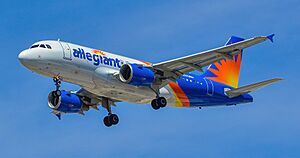
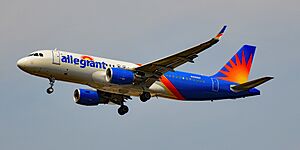
Allegiant Air is known for buying used planes or getting them at very low prices. Even though used planes might use more fuel, Allegiant flies them less often, which helps with costs.
When they first started in the late 1990s, Allegiant used McDonnell Douglas DC-9 jets. They flew these until 2002. Then, they replaced them with newer, but still older, McDonnell Douglas MD-80s.
In 2010, Allegiant bought six Boeing 757-200 planes. For a few years, they tried flying to Hawaii with these planes. But they stopped this service and sold the planes.
In 2012, Allegiant announced they would switch their main planes from MD-80s to the Airbus A320 family. They bought 35 Airbus A319-100 planes from other airlines. In 2013, they started adding Airbus A320-200 planes to their fleet.
In 2016, Allegiant bought its first brand-new planes. They bought 13 A320s directly from Airbus. They got a good price because Airbus was preparing to make a newer model. These new planes can hold 186 passengers.
The last 757 plane was retired in October 2017. In November 2018, the last MD-80 planes used by Allegiant were also retired.
In January 2022, Allegiant bought more new planes. This time, they bought 50 Boeing 737 MAX aircraft. They got a good deal because other airlines had canceled their orders. Allegiant plans to retire its oldest Airbus A320 planes. However, they will keep operating their other A320s alongside the new 737 MAX planes.
Planes Allegiant Used to Fly
Allegiant Air has also used these types of planes in the past:
| Aircraft | Total | Introduced | Retired | Replacement |
|---|---|---|---|---|
| Boeing 757-200 | 6 | 2010 | 2017 | Airbus A320 family |
| McDonnell Douglas DC-9-21 | 1 | 1998 | 2002 | McDonnell Douglas MD-80 series |
| McDonnell Douglas DC-9-51 | 3 | 1999 | ||
| McDonnell Douglas MD-82 | 2 | 2003 | 2013 | Airbus A320 family |
| McDonnell Douglas MD-83 | 49 | 2002 | 2018 | |
| McDonnell Douglas MD-87 | 4 | 2001 | 2013 | |
| McDonnell Douglas MD-88 | 8 | 2008 | 2018 |
Awards and Recognition
On June 24, 2024, Allegiant Air was named 2024 Best Low-Cost Airline in North America by Skytrax. This was the first time the airline received this award.
See also
 In Spanish: Allegiant Air para niños
In Spanish: Allegiant Air para niños
- Air transportation in the United States
 | Delilah Pierce |
 | Gordon Parks |
 | Augusta Savage |
 | Charles Ethan Porter |



